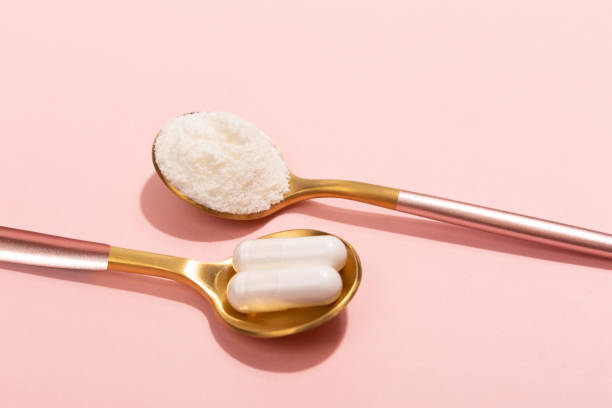A Comprehensive Exploration of Collagen

In the realm of skincare, nutrition and overall well-being, collagen has emerged as a buzzword, captivating the attention of health enthusiasts and researchers alike. As the most abundant protein in the human body, collagen plays a crucial role in various physiological functions, contributing to the structural integrity of tissues and organs. This essay aims to provide a comprehensive exploration of collagen, delving into its structure, diverse functions, dietary sources and the myriad of health benefits associated with its consumption.
Collagen: The Structural Scaffold of the Body
Collagen is a fibrous protein that forms the structural foundation of connective tissues throughout the body. Comprising a remarkable one-third of the body’s total protein content, collagen is found in skin, bones, tendons, ligaments, cartilage, blood vessels and other crucial structures. Its unique triple-helix structure, characterized by three intertwined polypeptide chains, grants collagen its strength and stability.
Types of Collagen
Collagen exists in various types, each serving specific functions in different tissues. Type I collagen, for instance, is predominant in skin, bones and tendons, providing tensile strength and resilience. Type II collagen is abundant in cartilage, contributing to its flexibility, while Type III collagen supports the structure of organs and blood vessels.
Collagen Synthesis
The synthesis of collagen is a complex process involving multiple steps. Cells called fibroblasts produce precursor molecules known as procollagens, which undergo enzymatic modification to form mature collagen fibers. Vitamin C plays a crucial role in collagen synthesis, as it is required for the proper functioning of enzymes involved in this process.
Collagen in Skin Health
The most visible impact of collagen is its role in maintaining skin health. Collagen provides the structural framework for the skin, contributing to its elasticity, firmness and hydration. As we age, collagen production naturally declines, leading to the formation of wrinkles, sagging skin and decreased skin resilience. External factors such as UV exposure, pollution and smoking can also accelerate collagen degradation.
Anti-Aging Properties
Collagen has become a cornerstone in anti-aging skincare, with many products containing collagen or promoting collagen synthesis. Some studies suggest that collagen supplementation may improve skin elasticity, hydration and reduce the appearance of wrinkles, providing a natural and holistic approach to maintaining youthful skin.
Wound Healing
Beyond aesthetics, collagen is crucial for wound healing. It forms the framework for tissue repair, promoting the closure of wounds and minimizing scarring. This regenerative property underscores collagen’s importance in the recovery process after injuries or surgical procedures.
Collagen in Joint and Bone Health
In addition to its role in skin, collagen is a vital component of joints and bones, contributing to their strength, flexibility and overall function.
Joint Health
Collagen is a major constituent of the cartilage that covers the ends of bones in joints. Type II collagen, in particular, is abundant in cartilage, providing cushioning and facilitating smooth joint movement. Collagen supplementation has shown promise in supporting joint health and may be beneficial for individuals with conditions like osteoarthritis.
Bone Density and Strength
Collagen is a key player in maintaining bone density and strength. It provides the structural framework for the mineralization of bones, enhancing their resilience to fractures. Research suggests that collagen supplementation may contribute to bone health by supporting the synthesis of bone matrix components.
Dietary Sources of Collagen
While the body produces collagen endogenously, certain dietary sources can supply additional collagen or support its synthesis.
Animal-Based Sources
Collagen is abundant in animal tissues, and consuming collagen-rich foods can contribute to the body’s collagen pool. Bone broth, made by simmering animal bones and connective tissues, is a popular source of collagen. Additionally, collagen supplements derived from fish, bovine or chicken sources are available in various forms, including powders, capsules and liquid.
Plant-Based Support
While plant-based foods don’t contain collagen, they can support collagen synthesis. Vitamin C-rich fruits and vegetables, such as oranges, strawberries and bell peppers, play a crucial role in collagen formation by supporting the enzymatic reactions involved in its synthesis.
Health Benefits of Collagen Supplementation
Joint Pain Relief
Collagen supplementation has been associated with reduced joint pain and improved function, especially in individuals with joint disorders like osteoarthritis. The additional collagen may contribute to the integrity and lubrication of joints, alleviating discomfort.
Skin Hydration and Elasticity
Studies suggest that collagen supplementation can enhance skin hydration and elasticity, promoting a more youthful appearance. By supporting the body’s natural collagen production, these supplements address the signs of aging from within.
Muscle Mass and Metabolism
Collagen is not limited to structural functions; it also plays a role in muscle health. Some research indicates that collagen supplementation, particularly with resistance training, may contribute to increased muscle mass and metabolic rate.
Gut Health
Collagen contains amino acids like glycine, which are essential for maintaining a healthy gut lining. Collagen supplementation may support gut health by promoting the integrity of the intestinal barrier and reducing inflammation.
Conclusion
In conclusion, collagen stands as a multifaceted protein that is integral to the structure and function of various tissues in the human body. Its significance extends beyond skin health, encompassing joint function, bone strength and overall well-being. As research continues to unveil the diverse roles of collagen and its potential health benefits, collagen supplementation has gained popularity as a holistic approach to promoting health from the inside out.
Whether through dietary sources like bone broth or collagen supplements, individuals are increasingly recognizing the value of incorporating collagen into their routines to support joint health, enhance skin vibrancy, and contribute to overall vitality. As we delve deeper into the intricate web of collagen’s functions, it becomes evident that this protein is not just a beauty trend but a fundamental building block that sustains the body’s structural integrity and resilience.



